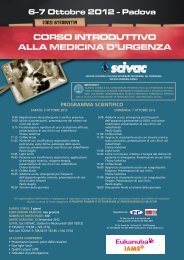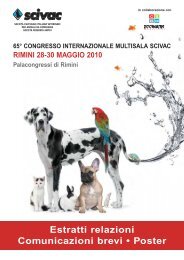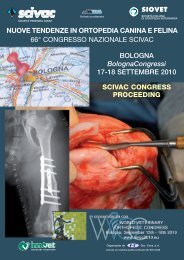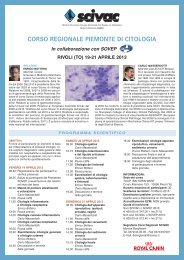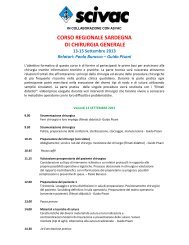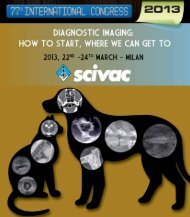58° Congresso Nazionale SCIVAC: Oncologia veterinaria
58° Congresso Nazionale SCIVAC: Oncologia veterinaria
58° Congresso Nazionale SCIVAC: Oncologia veterinaria
You also want an ePaper? Increase the reach of your titles
YUMPU automatically turns print PDFs into web optimized ePapers that Google loves.
58° <strong>Congresso</strong> <strong>Nazionale</strong> <strong>SCIVAC</strong> • Milano, 7-9 Marzo 2008 • <strong>Oncologia</strong> <strong>veterinaria</strong> - Alle soglie del III Millennio<br />
A greater understanding of the pathogenesis and biology of cancer coupled<br />
with major advances in biotechnology has resulted in the identification of rationally<br />
designed, target-based anticancer therapeutics, with new therapeutic opportunities<br />
and high expectations for the future as well as developmental challenges.<br />
Because these agents appear to principally target malignant cells, it is expected<br />
that they will produce less toxicity at clinically effective doses than nonspecific<br />
cytotoxic agents. The innate complexity of the networks and cross-talks<br />
that contain elements targeted by these agents also decreases the probability that<br />
any single therapeutic manipulation will result in robust clinical activity and success<br />
when used alone, particularly in patients with solid malignancies that have<br />
multiple relevant signaling aberrations. The predominant therapeutic manifestation<br />
of new biological agents in preclinical studies is due to decreased tumor<br />
growth rates and will likely be similar in the clinic; however, such manifestations<br />
are not readily detectable and quantifiable using nonrandomized clinical evaluations.<br />
A lot of drugs have been discovered as active agents in cancer: gefitinib,<br />
erlotinib sunitinib, sorafenib and others. For the most part, these agents have modest<br />
activity when used as single agents in patients with previously treated cancer.<br />
A major disappointment has been the failure of these novel agents to improve<br />
survival when added to standard chemotherapy, calling into question the validity<br />
of the preclinical model systems. Understanding the reasons why so many<br />
compounds that appeared promising in preclinical and early-phase clinical studies<br />
did not fulfill that promise when taken to large-scale randomized trials is a<br />
critical question. Several key issues will need to be addressed in the investigation<br />
of other novel compounds still in early development, primarily concerning the<br />
selection, interpretation, and reporting of preclinical studies and the design and<br />
interpretation of Phase I/II studies. Industry has moved too precipitously to bring<br />
novel compounds into Phase III clinical trials in a competitive push to be the first<br />
with a new class of agents. This accelerated advance to Phase III clinical studies<br />
without better understanding of who may benefit from a given novel agent has<br />
had the support of regulatory authorities and academic researchers anxious to<br />
find effective regimens. A more thorough comprehension of the multiple growth<br />
signaling pathways and of the roles of cross-talk, redundancy, and up-regulation<br />
of compensatory mechanisms is essential to making targeted therapies effective<br />
for more than small, difficult-to-define subgroups of patients. More research<br />
needs to be directed at understanding basic mechanisms of tumor growth and resistance.<br />
The recent pattern of negative Phase III trials threatens the future of the<br />
field, if companies and other investors in research decide to reallocate resources<br />
to disease conditions with a higher likelihood of successful outcomes.<br />
Address for correspondence:<br />
Giuseppe Curigliano<br />
Department of Medicine - New Drugs Development Unit, European Institute of Oncology<br />
Via Ripamonti, 435 - Milano<br />
48




